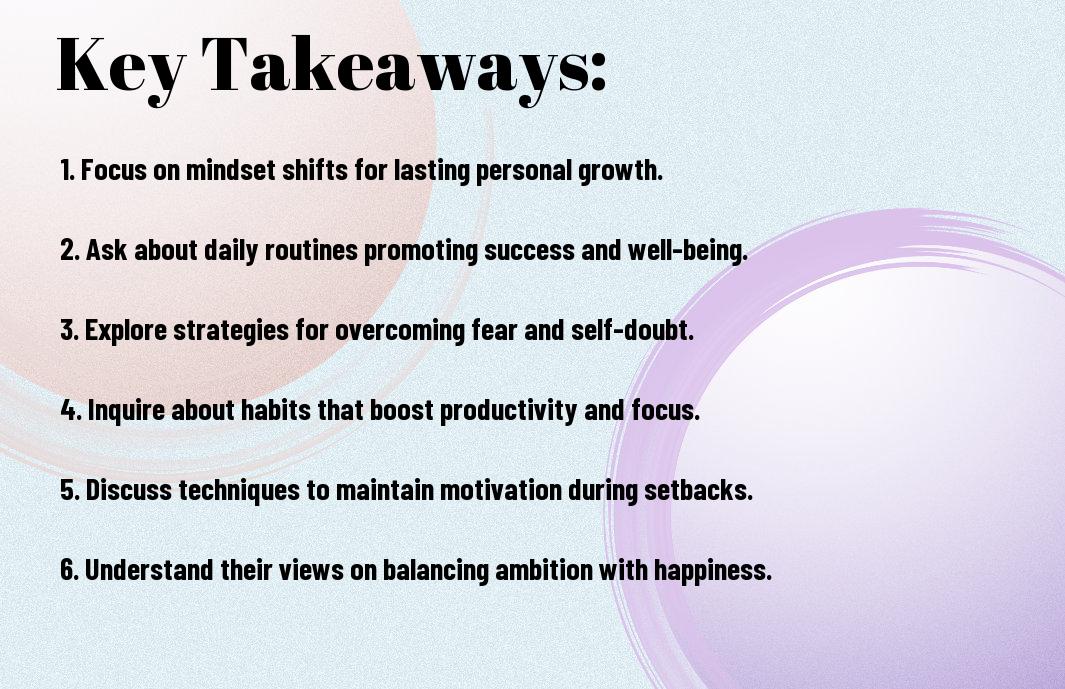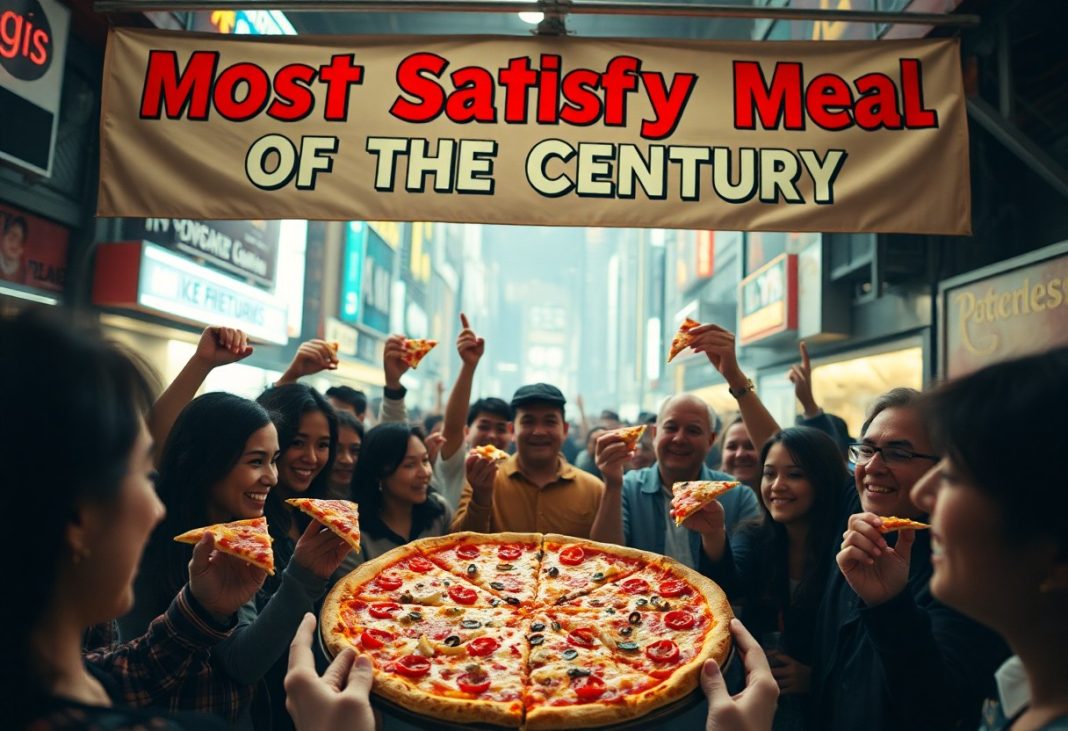With a prominent figure in personal development, you have a unique opportunity to gain insights that can transform your growth journey. Asking the right questions helps you uncover strategies, mindset shifts, and practical advice tailored to your goals. This guide will help you brainstorm 20 thoughtful questions designed to unlock valuable knowledge and inspire your path to self-improvement. By preparing these inquiries, you ensure your conversations are impactful and meaningful, directly contributing to your personal and professional evolution.
Key Takeaways:
- Develop questions that explore both personal experiences and professional insights to gain a well-rounded understanding of the figure’s approach to self-improvement.
- Include inquiries about practical strategies, mindset shifts, and obstacles they overcame to provide actionable lessons for personal growth.
- Focus on creating open-ended questions that encourage storytelling and deeper reflection, fostering engaging and meaningful conversations.
Understanding Personal Development
A solid grasp of personal development is necessary for anyone seeking to enhance their life quality and achieve meaningful goals. By exploring the principles and practical steps involved, you can unlock your full potential and foster continuous growth in both personal and professional spheres.
Defining the Concept
Behind personal development lies the idea of consciously improving your skills, mindset, habits, and overall well-being. It involves intentional actions that lead to self-awareness, emotional intelligence, and increased effectiveness in various aspects of your life.
Importance in Today’s Society
With the rapid pace of change and increasing demands in modern life, focusing on your personal development equips you with adaptability, resilience, and a proactive approach to challenges. It empowers you to stay relevant and thrive amid evolving circumstances.
Development in today’s world goes beyond individual benefits; it plays a key role in creating more empathetic, productive communities and work environments. When you invest in your growth, you contribute to a culture of continuous improvement that benefits society as a whole, enhancing collective well-being and innovation.

Influential Figures in Self-Improvement
It is important to recognize the influential figures who have shaped the world of personal development and self-improvement. These individuals provide valuable insights and guidance that can help you unlock your potential. Understanding their contributions will equip you with the right questions to ask, enabling you to learn from their experiences and philosophies.
Historical Perspectives
About historical perspectives, you can explore the foundational ideas set by pioneers like Ralph Waldo Emerson, Dale Carnegie, and Napoleon Hill. These figures introduced concepts that remain relevant and continue to inspire your growth journey. Knowing their legacy helps you appreciate how self-improvement practices have evolved over time and what principles remain timeless.
Contemporary Leaders
Behind today’s personal development movement are contemporary leaders who blend science with mindfulness, technology with empathy. Figures like Brené Brown, Tony Robbins, and Mel Robbins offer approaches that resonate with your modern challenges, using research-backed techniques and real-life stories to motivate change. Their methods often integrate innovation, making personal growth accessible in your fast-paced world.
In addition, contemporary leaders often engage directly with their audience through social media, podcasts, and online courses, allowing you to interact more personally and deeply with their work. They emphasize practical strategies tailored to your unique circumstances, empowering you to implement self-improvement tactics effectively in daily life.
Crafting Meaningful Questions
Not all questions are created equal when engaging with a prominent figure in personal development. To gain valuable insights, your questions should be thoughtful and purposeful, encouraging deep reflection and detailed answers. By focusing on what truly matters to your audience and the expert’s experiences, you elevate the conversation beyond surface-level responses, making your interview or discussion impactful and memorable.
Open-Ended vs. Closed Questions
One effective approach to crafting meaningful questions is distinguishing between open-ended and closed questions. Open-ended questions invite expansive answers and storytelling, fostering rich dialogue, while closed questions typically elicit specific, brief responses. When you aim to uncover personal philosophies or transformative experiences, open-ended questions will serve you best, allowing the figure to share their journey in depth.
The Role of Context
The context in which you frame your questions significantly shapes the quality of responses you receive. Providing background or connecting your queries to current trends and challenges in personal development helps your interviewee relate their answers to relevant situations. This encourages more nuanced and applicable insights that resonate with your audience.
Due to the diverse backgrounds and expertise within the personal development field, contextualizing your questions ensures they align with the speaker’s unique perspective and experiences. This thoughtful framing increases the likelihood of engaging, authentic answers that reflect the complexity of their work and your audience’s interests.
Key Themes to Explore
Despite the vastness of personal development, focusing on key themes allows you to dive deep into areas that truly impact your growth. Exploring motivation and mindset, strategies for growth, and overcoming obstacles helps you frame questions that reveal practical tools and insights. These themes ensure your conversation with a prominent figure will cover both the philosophy and actionable steps that drive self-improvement, enabling you to extract wisdom that is both inspiring and applicable in your own journey.
Motivation and Mindset
Against the backdrop of everyday challenges, your motivation and mindset shape how you respond to opportunities and setbacks. Delving into this theme helps you understand how to cultivate resilience and maintain drive when progress feels slow. By exploring how mindset influences your perception of success and failure, you gain perspective on how thought patterns fuel your personal development and how to steer them toward positive change.
Strategies for Growth
Growth demands more than just desire; it requires concrete strategies that guide your actions. Focusing on this theme uncovers techniques and routines that help you build habits, set goals, and track progress effectively. Understanding how to structure your growth journey maximizes your potential and allows you to align your efforts with meaningful outcomes, offering a blueprint for sustained self-improvement.
Consequently, when you dive deeper into strategies for growth, you equip yourself with practical frameworks tailored to your lifestyle and aspirations. This knowledge empowers you to design personalized growth plans, balance immediate wins with long-term ambitions, and adjust your approach based on real-world feedback. By engaging with a thought leader on this topic, you open doors to refined methods that bring your best self closer with every step.

Questions About Challenges
Unlike easy victories, challenges often reveal more about your character and growth. When you engage with a prominent figure in personal development, exploring their experiences with obstacles can offer you profound insights. Asking the right questions about how they navigated hardships helps you understand practical strategies and mindset shifts that can empower your own journey through difficulties.
Overcoming Obstacles
Above all, overcoming obstacles requires resilience and adaptability, qualities you can cultivate by learning from those who have faced their own struggles head-on. Asking how they identified solutions or reframed setbacks will provide you with perspectives that illuminate your path forward, making challenges feel like opportunities for growth rather than insurmountable barriers.
Dealing with Failure
With failure being an inevitable part of any growth process, understanding how prominent figures cope with setbacks can transform your relationship with your own missteps. Their approach to accepting, learning from, and moving beyond failure offers you practical methods to maintain momentum and confidence despite difficulties.
To dive deeper into dealing with failure, you might inquire about the specific techniques they use to shift their mindset after disappointment or how they stay motivated when results don’t meet expectations. This insight can help you develop a more constructive response to failure, viewing it not as a dead-end but as a necessary step toward your personal development.

The Impact of Technology
Once again, technology has transformed how you access and engage with personal development resources. From online courses to virtual coaching sessions, technology breaks down barriers, making self-improvement tools more accessible than ever. Understanding this impact helps you leverage advancements effectively, ensuring that your growth journey benefits from the latest innovations and tailored experiences designed to support your evolving needs.
Digital Tools for Growth
With a variety of apps, platforms, and software at your fingertips, digital tools provide personalized pathways to track, analyze, and enhance your progress. You can utilize habit trackers, meditation guides, and goal-setting apps to maintain focus and steadily advance toward your self-improvement objectives. Embracing these technologies allows you to tailor your development process in ways that suit your lifestyle and preferences.
Social Media Influence
Below the surface of casual scrolling, social media plays a significant role in shaping your mindset and motivation. Connecting with thought leaders, joining supportive communities, and consuming motivational content can inspire and accelerate your journey. However, it’s important to engage critically, curating your feed to emphasize positive influence and avoid distractions that may hinder your progress.
Digital platforms amplify voices and ideas, allowing you to access an abundance of perspectives in the personal development sphere. This connectivity encourages you to participate in discussions, share your experiences, and find accountability partners. Being mindful of how you interact with social media enables you to harness its power as a tool for meaningful growth rather than a source of comparison or overwhelm.
Conclusion
Conclusively, crafting 20 thoughtful questions for a prominent figure in personal development allows you to gain deep insights into self-improvement strategies and philosophies. By carefully selecting questions that resonate with your goals and challenges, you create an opportunity to learn directly from experienced voices in the field. This process not only enhances your understanding but also inspires you to apply practical advice to your own growth journey, ultimately empowering you to make informed decisions that foster lasting positive change.
FAQ
Q: How can I prepare effectively to interview a prominent figure in personal development?
A: To prepare effectively, research their background, key philosophies, and recent work to tailor your questions specifically. Focus on areas where they have unique insights or experiences. Organizing your questions into themes, such as mindset, habits, or challenges, helps create a coherent flow during the conversation.
Q: What types of questions lead to more insightful answers from experts in self-improvement?
A: Open-ended, thought-provoking questions encourage experts to share deeper insights. Instead of yes/no questions, ask about their personal experiences, challenges they have overcome, or advice for a specific scenario. Questions that invite storytelling or reflection often provide richer, more engaging responses.
Q: How many questions should I prepare, and how flexible should I be during the interview?
A: Preparing around 15 to 20 questions is ideal to cover a range of topics without overwhelming the interviewee or the conversation. However, it’s important to stay flexible; be ready to follow up on interesting points they raise or allow the conversation to flow naturally rather than rigidly sticking to your list.





